| Here in the US, reading among adults has apparently fallen off drastically. It's also said that in the States, "boys don't read." Do you know if this is the case in the UK as well?
|
There is no doubt that the success of Harry Potter has revived reading in both sexes. And other authors like Philip Pullman have also been very successful in the same market - there is evidence of much stronger reading in boys than was the case ten years ago.
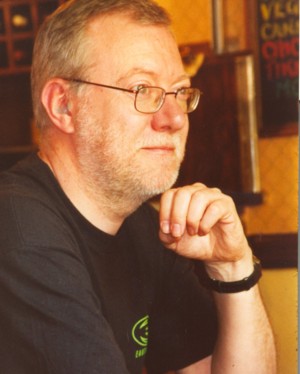
John Jarrold - summer 2004
|
| Explain the difference between an editor and a senior editor. | Each publisher has a number of editors working for it. Senior editors/editorial directors are sometimes in charge of an entire imprint, and are often the person to whom the more junior editors report.

|
From 1990-1992 you were the director of Orbit books, and dealt with authors such as:
Poul Anderson, David Brin, Terry Brooks, Arthur C. Clarke, Gordon R. Dickson, Alan Dean Foster, Harry Harrison, Robert Jordan (acquired first three Wheel of Time novels), Anne McCaffrey, Larry Niven, Jerry Pournelle.
Can you share some anecdotes? |
Every author requires editing, because no one is perfect. Some books need more, others less. Rob Holdstock has been a friend since the early 70s, and it was an enormous pleasure to work with him here, and later on with S&S. Iain Banks had also been a friend, met through SF conventions, before I became first his paperback editor at Orbit, and then his main UK editor, when I moved his hardbacks from Macmillan to Orbit with Use of Weapons in 1990. A great and good man. I can't go through them one by one, but they were all extremely professional and remain friends to this day.
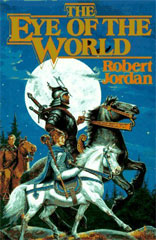
|
| How did you 'acquire' each author? |
Every editor receives around thirty submissions a week from agents and directly from authors (the dreaded slush pile). Because Orbit had been publishing since 1974, there were obviously authors there I inherited. I took on Robert Jordan and Arthur C Clarke for Orbit after their books were submitted to me. If an author has an agent, one speaks to them, rather than the author directly, when a possible contract is mooted - although occasionally one might meet an author at a convention and hear that they aren't particularly happy with their present publisher, which can lead to conversations within the publishing company one works for, and with the author's agent.

|
| Can you share any anecdotes about the acquisition of the 3 Wheel of Time novels - did you think they'd be such a hit as they are, etc. |
The truth is that taking on any author depends upon a mixture of knowledge of the market and a subjective pricking of your thumbs. I felt that Jordan was writing the most interesting and commercial epic fantasy I'd seen in some time when The Eye of the World was submitted in late 1988. You hope for the sort of success that followed, but you can't expect it - because you can't second-guess the reading public, which is a Good Thing!
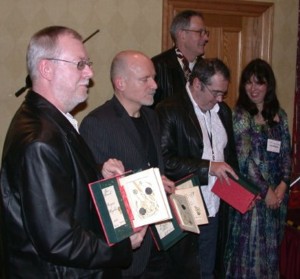
BSFA Award Ceremony - Easter 2007
John Jarrold, Jon Courtenay Grimwood, Ian McDonald, Geoff Ryman, Liz Williams
|
From 1992 to 1997 you were editorial direction of Legend Books and dealt with such authors as:
Greg Bear, Terry Brooks, Orson Scott Card, CJ Cherryh, Alan Dean Foster, Maggie Furey (acquired first novel, Aurian, plus sequels), Ken MacLeod (acquired first novel, The Star Fraction, plus sequels), and Elizabeth Moon.
Can you share any anecdotes. |
When I was head-hunted to take over Legend, I'd already met Greg Bear, David Gemmell and Tad Williams at conventions - it's one of the pleasures of being involved in SFF, you do meet pros on a regular basis. So this meant that they were aware of me when they were told I'd be their new UK editor. Harry Harrison was already a chum, and others became friends over the years. Ken MacLeod's Star Fraction is one of those books I can honestly say I stayed up until 3 a.m. finishing, on the day it arrived from his agent. Again, I'd met Ken previously, because he is an old friend of Iain Banks, and I knew he was writing a novel.

|
| You acquired the first novel of Maggie Furey. How did this come about? |
Maggie's agent sent out material to a number of UK publishers and I was lucky enough to be enthusiastic enough (and offer the right amount of money) to take her on. In general terms, a book is published around twelve months after it's delivered - that's true for most authors, new or established, although there are exceptions, of course. that allows the publisher time to work on a cover design, and also to get material to the book trade, in order to persuade them to take lots of copies.

Jon Courtney Grimwood and John Jarrold
|
| From 1997 to 2002 you spent two days a week working on a self-employed, contract basis for Simon & Schuster UK (plus one day a week working from home), setting up a new SF and Fantasy list, Earthlight.
Can you elaborate on this? |
The then-Managing Director of S&S UK, Nick Webb, was a friend and we'd worked together previously. He wanted to set up an SF imprint there, and asked me to do so. Setting up a new imprint means taking on authors from scratch, of course, both in terms of already-published writers and new writers. Again, background knowledge and contacts with authors, agents and the bookselling trade were vital, so we launched eleven months after I moved to S&S and luckily the list built a good reputation.
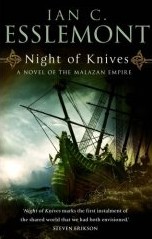 |
| How does science fiction sell in the UK? Setting up so many imprints - must be popular? |
Fantasy and SF makes up just under 10% of all paperback fiction sold in the UK - that's about the same as thrillers or crime novels. It's big business.
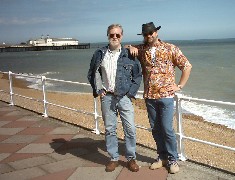
Jarrold and Jon George on the seafront, Easter 2002 |
| You commissioned all cover artwork for Earthlight books during this period. What does this entail? |
I worked with an outside design agency, but suggested specific artists for specific books after discussion with my editorial and sales colleagues. Every book published is fully briefed, sometimes as a 'design', like the Jon Courtenay Grimwood covers, sometimes with an artwork idea. It's a commercial business, so covers are very important and can't be left to chance. And I always wrote all the cover copy, with Orbit, Legend and Earthlight!
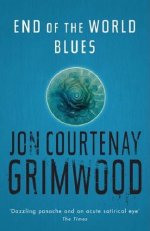
|
| You appeared on the radio books programme And Now Read On(first on BBC Radio 5, latterly on BBC Radio Wales as Off the Shelf), where you comment on unpublished authors' typescripts and discuss fiction and fiction writing with the presenter, novelist Phil Rickman. You have also discussed SF and fantasy on the BBC Radio 2 Arts Programme with Sheridan Morley, BBC Southern Counties Radio, Meridian TV's arts programme The Pier, and the satellite TV channel European Broadcasting News.
You comment on unpublished authors typescripts. Not manuscripts? |
We say typescripts because they are typed now, not written manually! If the author sends in their script to a programme on which scripts are discussed, they must be happy for one to do so! I'm an outside voice on this programme, so all the work comes via the BBC.
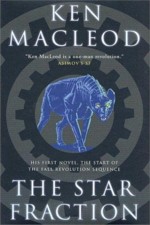
|
| Was Sheridan Morley a fan of science fiction? |
Yes, he was terrific. Not someone who had read extremely widely in the genre, but very interested.

The late Sheridan Morley
Theatre critic, son of Robert Morley |
| You went to South Korea in September 2003 to take part in the UK-Korea Fantasy Publishing Forum, and worked withtheir government's creative agency, KOCCA, to involve UK SF/Fantasy authors in Korean animation projects.
Can you give us an update on this?
|
I put all the major SF agents in London in touch with Korean publishers, after which I bowed out! The overseas publisher commissions the translation, and many, many UK and US authors are published through Europe and the Far East, which are big markets for this genre.

Jarrold, Graham Joyce and Chaz Brenchley
Worldcon 2005 in Glasgow
|
| I see from your "Quotes" page that you have acted as "script doctor" for some big names including Michael Moorcock. Is it possible/allowed for you to explain what the original scene was like and how it changed because of your ministrations? |
No, I edited Mike when I was with S&S, but the authors who have kindly supplied quotes for the website are those I worked with when I was five-days-a- week in publishing. The Script Doctor work is mostly with unpublished writers who want someone like me to give them editorial thoughts and notes on a novel so they can rewrite it before submitting to agents or publishers.

|
| You're now an agent. Does this mean you no longer work for publishers - as that'd be conflict of interest? Why did you make the change? Different worlds to conquer? |
I still edit for publishers, but obviously not one of the books I've sold them! The agency is relatively new and, as a couple of highly-placed publishers said, if I get to the end of 2008 making 50% of my income from the agency I will be doing very well. I'm on course to achieve that. |
|
From your website: "Caitlin Blasdell of Liza Dawson Associates in New York, representing the John Jarrold Literary Agency, has concluded a three-book deal with Fleetwood Robbins of Del Rey Books."
Explain how British books get published in the US? Caitlin works for Liza Dawson Associates in New York, so did you hire her to try to place the books? |
Some agencies on both sides of the Atlantic have sub-agents on the other side - as they do in Europe and the Far East. In this case, Caitlin was that author's US agent with the previous UK agent, and when I took them on I felt it made sense for that relationship to continue, so she now represents me for that specific writer. I know the main SFF editors in New York, after fifteen years working in publishing, so at the moment I represent myself otherwise.
Obviously, one signs a contract that limits the market in which a book can be sold (be it a UK author in the US or vice versa). And changing between US and UK details is less prevalent than it was.

|
| What is a world rights deal? Can you explain the copyright laws in the UK? |
When a publisher acquires world rights, it means that have paid a higher advance to sell the book throughout the world, in all markets, and the author takes a high percentage of those deals. that's as opposed to me as a UK publisher signing UK and Commonwealth rights, or a US editor signing up US and Canadian rights, which used to be the normal deal. In 2007, many managing directors like to spread the 'risk' of acquiring a new writer over more than the home edition of their work, and of course it means that the entire company is working to make that author succeed!
UK copyright means that the author's estate retains their rights to the book's copyright until 70 years after the author's death. Yes, it varies in different countries. |















